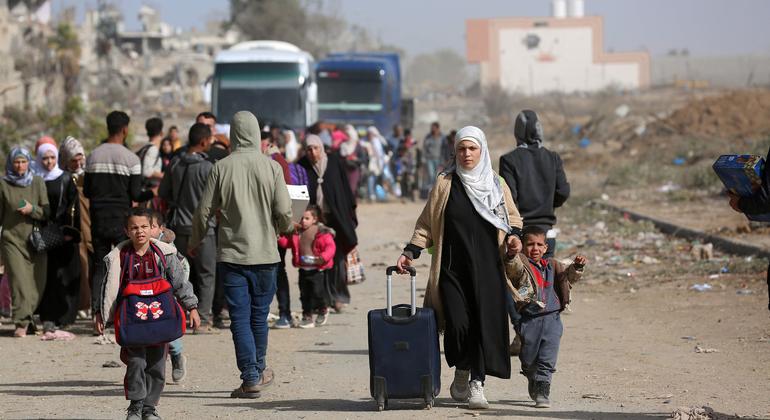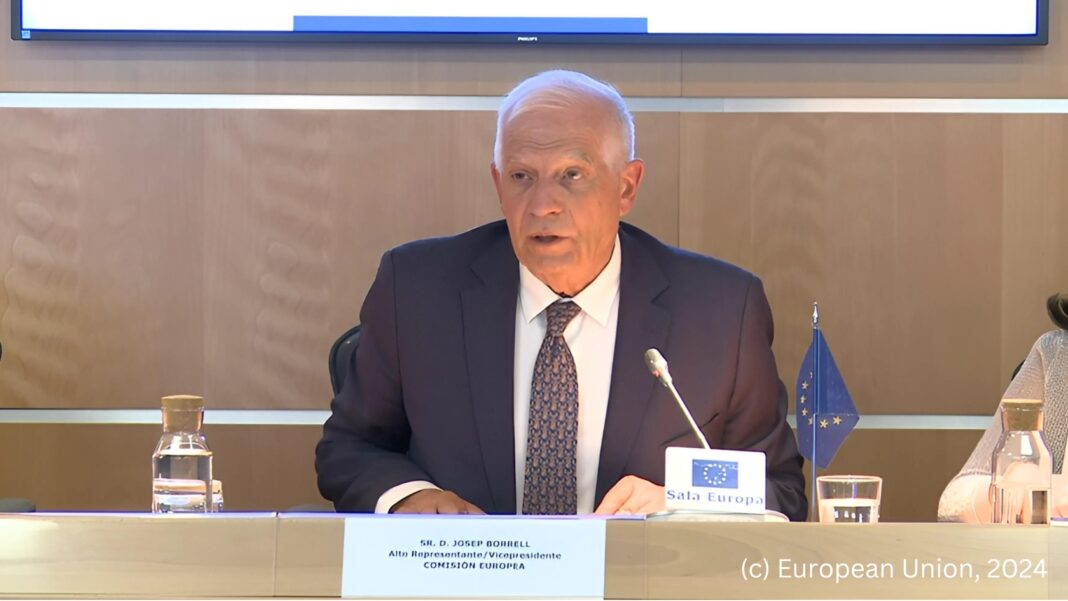In an alert, the World Food Programme (WFP) described markets “in decay” across the enclave. “Fresh foods, eggs, and meat barely exist and the prices of any food available have reached record highs,” the UN agency said on X, just days since UN-backed hunger experts warned that famine thresholds may have already been crossed in northern Gaza, or will be soon.
Starving the north
“So far in November, every attempt by the UN to access besieged areas of north Gaza governorate with food and health missions to support tens of thousands of people remaining there was either denied or impeded,” the UN aid coordination office, OCHA, noted in its latest update.
The development comes amid continuing Israel Defense Forces strikes in northern Gaza into Wednesday, where UN aid teams have reiterated how people fleeing attacks and evacuation orders in Beit Hanoun for Gaza City now shelter in unsafe schools that could collapse at any time. In October alone, the UN Children’s Fund (UNICEF) recorded 64 attacks against schools, “the majority sheltering displaced people”.
According to OCHA, up to 130,000 people have been displaced from northern Gaza amid intensifying Israeli attacks targeting residential buildings and repeated evacuation orders.
UN humanitarians have told UN News that dogs have been seen setting upon dead bodies left lying in open ground, while healthcare access across Gaza remains precarious, with the UN reproductive health agency, UNFPA, together with partners, pointing to a recent rise in premature births and maternal deaths.
‘Relentless struggle’
“Over 155,000 expectant and new mothers are caught in a relentless struggle marked by exhaustion, trauma, and severe hunger,” UNFPA said, a situation made worse by the fact that fewer than half of Gaza’s 36 hospitals are partially functional, along with just 47 out of 133 primary health centres, according to the UN World Health Organization (WHO).
Since Hamas-led terror attacks and hostage-taking in Israel that sparked the war in Gaza 13 months ago, more than 43,469 people have been reportedly killed in Gaza; most are civilians and at least 10,000 remain trapped under the rubble of their homes and shelters, the WHO noted.
Israeli strikes kill dozens a day in Lebanon
In Lebanon, meanwhile, UN aid agencies warned that at least 241 people have been killed and 642 injured the week to 11 November “due to Israeli airstrikes”.
Citing the Lebanese authorities, OCHA’s latest update on the emergency added that a total of almost 3,300 people have been killed – including 203 children and 644 women – with 14,222 injured since 8 October 2023.
“At least one child was killed and 10 children were injured every day in Lebanon, in October 2024 alone,” the UN agency continued, highlighting the UN children’s agency UNICEF’s appeal to the warring parties “to meet their obligations under international humanitarian law and protect children”.
Despite such appeals, Israeli strikes have continued across Lebanon targeting Hezbollah fighters, along with strikes on Israel by the Lebanon-based group. The violence continues to “claim lives, uproot communities and destroy homes and critical infrastructure”, OCHA said.
“Intensified Israeli airstrikes have had major impacts in South Lebanon, Nabatieh, Bekaa, Baalbeck-Hermel and Mount Lebanon governorates.
An airstrike on a residential building in Lebanon’s northern Akkar on 11 November reportedly killed at least 18 people and injured 14, it added, citing the Lebanese authorities. “On 10 November, a strike on a home sheltering displaced families in Aalmat town in Jbeil, Mount Lebanon Governorate, killed at least 23 people, including seven children.”
Homes ‘repeatedly targeted’
In previous weeks residential buildings hosting displaced people have been “repeatedly targeted”, the UN humanitarian coordinators insisted, citing a strike in Aito-Zgharta, north Lebanon and in Barja-Chouf, Mount Lebanon, “which together claimed over 40 lives”.
The UN peacekeeping mission that monitors the Blue Line separating Lebanon and Israel, UNIFIL, has also reported “numerous violations” since the escalation of violence in late September. “This includes more than a half a dozen direct attacks on peacekeepers,” OCHA reported.
The most recent incident occurred on 8 November, when two Israeli army excavators and one bulldozer reportedly destroyed part of a fence and a concrete structure in a UNIFIL position in Ras Naqoura.
Attacks on healthcare providers
In addition to attacks on areas sheltering civilians, airstrikes on health facilities and workers continue to be recorded by WHO, interrupting operations in 127 health facilities and eight hospitals, reducing the functionality of nine hospitals. In the first week of November there were attacks on health services, and two deaths and seven injuries among health workers, according to WHO.
Since mid-September 2024, the surveillance system for attacks on health care (SSA) reported 44 attacks against healthcare resulting in 63 injuries and 91 deaths, bringing the total of attacks against health care to 103 incidents resulting in 123 injuries and 145 deaths since 8 October 2023.
Peacekeeping chief visits UNIFIL headquarters
UN Peacekeeping chief Jean-Pierre Lacroix met some of the thousands of ‘blue helmets’ serving in southern Lebanon with the UNIFIL mission on Wednesday.
“He spoke to peacekeepers who had been injured in direct attacks and exchanges of fire between the IDF and Hezbollah,” said UN Spokesperson Stephane Dujarric, briefing reporters in New York.
“He visited UN positions in Mansouri and the Mission’s headquarters in Naqoura.
He also met UNIFIL staff who continue supporting the mission’s work in Naqoura and with the mission’s senior leadership. He also expressed his gratitude to both the military and civilian staff of UNIFIL for their dedication and commitment to the important work of the Mission during this exceptionally challenging time.”
On Tuesday he met Lebanon’s caretaker Prime Minister Najib Mikati together with the Special Coordinator for Lebanon, Jeanine Hennis-Plasschaert, and the Head of the Peacekeeping Mission in Lebanon, General Aroldo Lázaro.
“The three stressed the criticality of UNIFIL’s role and highlighted the importance of resolution 1701,” Mr. Dujarric added.





